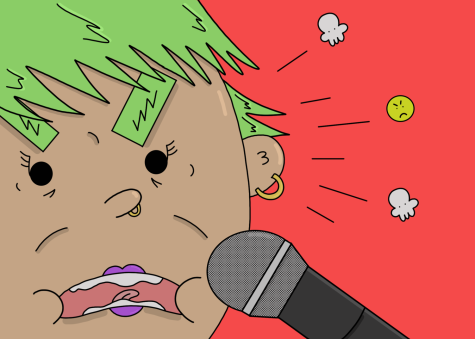Editorial: Get to know the artist you’re seeing in concert
April 7, 2023

In an instant, the lights go on. You feel your excitement begin to electrify your skin. The moment to sing along with your favorite artist has arrived. You’ve listened to their albums. You’ve even made your own costume. The concert begins, but no one around you knows the lyrics.
Even after waiting an excruciating eight hours for a ticket from Ticketmaster, nothing could compare to the awkwardness of this moment.
Live performances are back after COVID and more popular and chaotic than ever. Twitter feeds and viral TikToks have been circulating with artists yelling at their fans or even ending performances early in retaliation against mistreatment from concertgoers who throw things or find other creative ways to completely ruin the fun for everyone.
Concerts are a space for communities to come together to celebrate art that they love; silent crowds full of outsiders or people who are too cool to sing can ruin the experience for everyone.
Gen Z is often blamed for poor concert etiquette, a feat caused primarily, arguably, by the rise of social media. Gen Z is the first generation to grow up with social media and technology as we know it, gone are the days of picking a song for a MySpace account; now social media is completely saturated with music. Well, saturated with 15 second snippets of millions of songs.
TikTok in particular has changed the way we discover and experience music; the constant influx of new songs is great, but the rapid fire scrolling paired with the short length clips that circulate are diminishing our ability to connect with music to some extent. We see new and existing artists emerge more popular than ever before, all thanks to a viral sound that takes them from underground to mainstream. This concept of overnight success or mainstream audience is part of the problem.
The immediate popularity of a single song is not unheard of, but now, it’s not songs that are sticking with listeners – it’s a chorus, or a bridge, or a piece of a verse. That’s just fine for the purposes of creating content or even just for the enjoyment of the average casual listener, but for those who listen to the entire song, or even the entire album of an artist, there’s a disconnect.
Now, audiences are packed into venues to see an artist who many are only familiar with through their brief, viral discography. This creates a lackluster and even uncomfortable environment for everyone involved; the fans who want to sing without the added pressure of being heard in an eerily quiet crowd and those who don’t know the songs and feel less involved as a result.
While there’s nothing wrong with seeing an artist you don’t know or maybe have only heard a few songs of, all should be welcome to enjoy, there is something disheartening about an artist realizing in real time that no one knows the music they worked hard to create.
Live performances can and should be a transformative experience for everyone involved, especially considering the expense of attending. For many, concerts are a luxury they can only indulge in once or twice a year, if at all possible, because of how expensive ticket prices are.
Letting people enjoy things also means respecting the sanctity of community experiences by being a kind, passionate and active participant.







